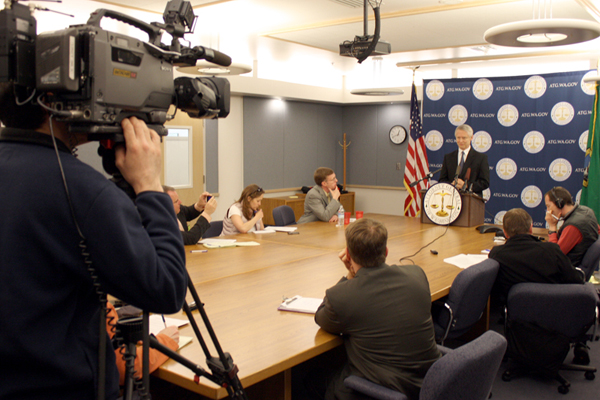R-71 records: McKenna, Reed head to Supreme Court
Attorney General Rob McKenna and Secretary of State Sam Reed hope to persuade the U.S. Supreme Court to uphold the state’s strong voter-approved Public Records Act and the policy of allowing release of initiative and referendum petitions, as most states do.
 Reed, the state’s chief elections officer, is the respondent in the closely watched Doe v. Reed lawsuit that could affect how petitions are handled across America. He and McKenna met with the press on Monday to describe the landmark nature of the case, and to express optimism that the state will prevail. Oral arguments are on Wednesday of next week. McKenna will spend this next week in D.C. preparing, and will be joined by Reed for the hearing.
Reed, the state’s chief elections officer, is the respondent in the closely watched Doe v. Reed lawsuit that could affect how petitions are handled across America. He and McKenna met with the press on Monday to describe the landmark nature of the case, and to express optimism that the state will prevail. Oral arguments are on Wednesday of next week. McKenna will spend this next week in D.C. preparing, and will be joined by Reed for the hearing.
A quick recap: foes of a newly passed “everything but marriage” law expanding domestic partner benefits mounted Referendum 71 to place the issue on last November’s statewide ballot. When some supporters of the new law announced plans to request copies of the R-71 petition sheets, Protect Marriage Washington secured a federal court order blocking the public release. U.S. District Judge Benjamin Settle ruled that release violates a constitutional right to “anonymous” free political speech. He was overturned by the 9th Circuit Court of Appeals, which upheld the state’s policy of viewing the voter-approved Public Records Act as requiring release of the documents. Protect Marriage Washington and unidentified plaintiffs headed to the Supreme Court. The names of the 138,000 people who signed R-71 petitions have not been released. The new law was approved by the voters.
McKenna told reporters that signing initiative and referendum petitions is a way citizens participate in the legislative process and that their names become public records when the sponsor submits petition sheets to the Secretary of State for verification. He added:
“We don’t legislate in secret in this state. … This is a legislative act, not core political speech.”
Reed said voters created both the initiative process and the Public Records Act, and have a great interest in having “transparency, openness and accountability in how we conduct our government” and also expect full access to the initiative process. He said we don’t have to choose one or the other.
The state expects a ruling within a few months. The issue of potential harassment of signers is not included in this lawsuit — just the central question of whether public release chills “anonymous” political speech. A Thurston County Superior Court case brought by initiative activist Tim Eyman to block release of all petitions is on hold while the high court is taking up this issue.
